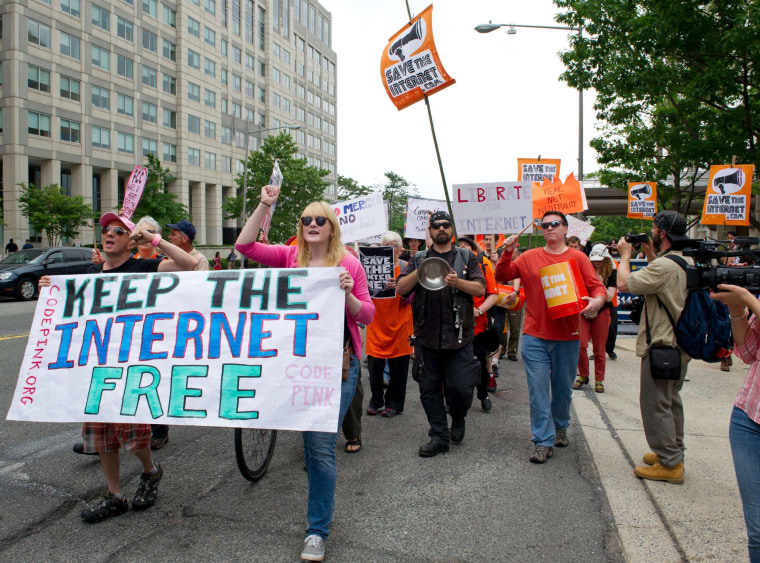Tech companies are banding together to make a final push to stop a fait accompli.
Google, Facebook, Netflix, Twitter, and 80,000 other top websites and organizations have joined together for a "Day of Action" to protest a retreat from the concept of "net neutrality." They are angry that the Trump administration wants to roll back regulations requiring internet service providers to treat all data and customers equally online, and the companies are encouraging consumers to give their feedback on the Federal Communications Commission's website.
Banners, pop-ups, push notifications and videos will be seen across participating websites, urging visitors to tell the FCC what they think. Don't be surprised if you see your friends changing their social media avatars or profile pictures, too.
Google declined to share specifics about its involvement, but users searching "what is net neutrality" or "net neutrality day of action" will get a call-out box with information at the top of their results.
A discreet text banner on the top of Netflix.com directed users to a call-to-action page created by the Internet Association, an industry trade group.
Smaller websites published stories featured on their front page, or added an extra pop-up when users tried to submit standard comments.
"In true internet fashion, every site is participating in its own way," Evan Greer, campaign director of Fight for the Future, told NBC News. "Most are using our widgets that allow visitors to easily submit comments to the FCC and Congress without ever leaving the page that they're on. Many are getting creative and writing their own code or displaying their own banners in support of net neutrality that point to action tools."
What's It All About?
The critical issue is whether the internet be an all-you-can-eat buffet of information, videos, and LOLCAT memes; or an à la carte menu. Should internet providers be allowed to strike deals to deliver some kinds of content, such as their own or those partners have paid them for, at a faster speed? Should the internet be more like cable, where you subscribe to a package of sports, entertainment, and news websites?
"No," said millions of consumers the last time the FCC took public comment. Over 4 million consumers lodged their comments.
Internet service providers and cable companies argue that Obama-era regulations enacted in 2015 intended to protect net neutrality are the wrong approach, and that a "light touch" is preferred.
"The internet has succeeded up until this point because it has been free to grow, innovate, and change largely free from government oversight," wrote the NCTA, the Internet & Television Association, the primary broadband and cable industry trade group, in its statement on net neutrality. Comcast, the parent company of NBC News, belongs to the NCTA.
The statement proposes scrapping the regulations, which treat broadband like a "common carrier," required to transport "passengers" of data at the same rate, with a different set of rules. The NCTA said its proposal "empowers the internet industry to continue to innovate without putting handcuffs on its most pioneering companies."
A poll from Morning Consult and the NCTA found that 61 percent of consumers either strongly or somewhat support net neutrality rules.
The view of President Donald J. Trump's appointed FCC chair Ajit Pai is in line with that of the ISPs. He vowed earlier this year to roll back the new rules in order to protect consumers.
“It’s basic economics. The more heavily you regulate something, the less of it you’re likely to get,” he said in a speech at the Newseum in Washington in April.
FCC spokesman Mark Wigfield declined a NBC News request for comment on today's planned action.
As part of the day of protest, Silicon Valley companies and website operators are raising concerns over the rule change, fearful it will favor Goliaths over Davids.
With the FCC chair in favor of revising the rules, committee votes on his side, a thumbs-up from President Donald Trump, and a Republican-controlled Congress, today's actions aren't likely to sway the commission.
Instead the number of consumer comments flooding the FCC today will become a data point used by net neutrality proponents if the rule changes end up in court, as activists have vowed.
"Consumers hate buffering and slow-loading and will abandon videos and services if they're not getting a good viewing experience," said Michael Chea, general counsel for Vimeo, a video-sharing site favored by independent artists.
"[Companies] can throttle some websites over others, favor their own content," said Chea. "This is another thing that will reduce choice, increase costs, and reduce innovation."

